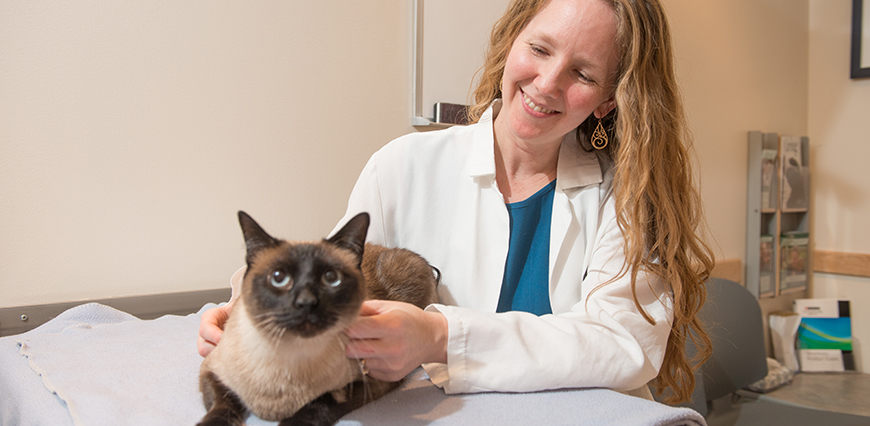
Evaluating new treatment for chronic kidney disease
Veterinarians at CSU researched the use of adult stem cells to help limit and potentially reverse damage in cats with chronic kidney disease. Chronic kidney disease (CKD) in cats and humans is characterized by inflammation and fibrosis of the kidneys as the final disease pathway. Stem cells have shown promise in rodent CKD models in helping to reduce inflammation and stabilize function of kidneys. This is crucial as in both humans and cats there is no treatment that definitively restores renal function besides a kidney transplant, an invasive and often out-of-reach surgery.
A recent study conducted at CSU recruited eight cats with CKD and randomized them into a placebo and treatment group. The treatment group had the stem cells administered via an intravenous route. No adverse effects were observed indicating the safety of the procedure. However, no significant improvement in renal function was found either. One theory for the lack of improvement in cats as compared to rodents is that the chronic, naturally occurring disease in cats responds differently than the recently-induced kidney changes in rodents. Dr. Quimby emphasized that “for this reason cats serve as a better model for developing treatments that have the potential to cross-over and really be meaningful for human chronic kidney disease because… it is a naturally occurring disease [and cats] have chronic disease.”
Promising research avenues to learn if stem cells can help reverse kidney damage in cats remain to be explored, and, as Dr. Quimby points out, “this is something that we looked into and more work needs to be done.” Long-term studies with larger cohorts are needed to identify if stem cells can help with CKD as different studies have found conflicting results. Another potential factor to study is whether the route of administration of stem cells can affect the outcome. Anecdotally, some owners have noticed improved quality of life in their cats with stem cell treatments. While a perfect stem cell treatment has not been found yet, working with our feline friends might just help us make advances in human CKD as well.
Key benefits of the findings:
- Emphasizes the important role research in naturally occurring diseases in companion animal models can serve in translational chronic disease and treatment research.
- Early studies have indicated the safety and lack of adverse effects of this specific stem cell treatment .
- While this study did not find that stem cells significantly improved measures of kidney function, it provides important information to direct future studies.
ABOUT THE INVESTIGATORS
Jessica M Quimby, DVM, PhD, DACVIM
Tracy L Webb, DVM, PhD
Elissa Randall, DVM, ACVR
Angela Marolf, DVM, ACVR
Alex Valdes-Martinez, DVM, DACVR
Steve W Dow, DVM, PhD, ACVIM
References
Press release: https://denver.cbslocal.com/2014/11/26/csu-researchers-using-stem-cell-therapy-to-treat-kidney-disease-in-cats/
Press release: https://www.sciencedaily.com/releases/2019/03/190314123215.htm
Quimby JM, Webb TL, Randall E, et al. Assessment of intravenous adipose-derived allogeneic mesenchymal stem cells for the treatment of feline chronic kidney disease: a randomized, placebo-controlled clinical trial in 8 cats. J Feline Med Surg 2015;8(2):165.



